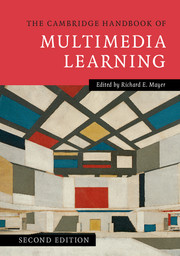Book contents
- The Cambridge Handbook of Multimedia Learning
- The Cambridge Handbook of Multimedia Learning
- Copyright page
- Contents
- Contributors
- Preface
- Acknowledgments
- 1 Introduction to Multimedia Learning
- Part I Theoretical Foundations
- Part II Basic Principles of Multimedia Learning
- Part III Advanced Principles of Multimedia Learning
- 15 The Guided Discovery Learning Principle in Multimedia Learning
- 16 The Worked Examples Principle in Multimedia Learning
- 17 The Self-Explanation Principle in Multimedia Learning
- 18 The Generative Drawing Principle in Multimedia Learning
- 19 The Feedback Principle in Multimedia Learning
- 20 The Multiple Representation Principle in Multimedia Learning
- 21 The Learner Control Principle in Multimedia Learning
- 22 Animation Principles in Multimedia Learning
- 23 The Collaboration Principle in Multimedia Learning
- 24 The Expertise Reversal Principle in Multimedia Learning
- 25 The Individual Differences in Working Memory Capacity Principle in Multimedia Learning
- Part IV Multimedia Learning of Cognitive Processes
- Part V Multimedia Learning in Advanced Computer-Based Contexts
- Author Index
- Subject Index
20 - The Multiple Representation Principle in Multimedia Learning
from Part III - Advanced Principles of Multimedia Learning
Published online by Cambridge University Press: 05 August 2014
- The Cambridge Handbook of Multimedia Learning
- The Cambridge Handbook of Multimedia Learning
- Copyright page
- Contents
- Contributors
- Preface
- Acknowledgments
- 1 Introduction to Multimedia Learning
- Part I Theoretical Foundations
- Part II Basic Principles of Multimedia Learning
- Part III Advanced Principles of Multimedia Learning
- 15 The Guided Discovery Learning Principle in Multimedia Learning
- 16 The Worked Examples Principle in Multimedia Learning
- 17 The Self-Explanation Principle in Multimedia Learning
- 18 The Generative Drawing Principle in Multimedia Learning
- 19 The Feedback Principle in Multimedia Learning
- 20 The Multiple Representation Principle in Multimedia Learning
- 21 The Learner Control Principle in Multimedia Learning
- 22 Animation Principles in Multimedia Learning
- 23 The Collaboration Principle in Multimedia Learning
- 24 The Expertise Reversal Principle in Multimedia Learning
- 25 The Individual Differences in Working Memory Capacity Principle in Multimedia Learning
- Part IV Multimedia Learning of Cognitive Processes
- Part V Multimedia Learning in Advanced Computer-Based Contexts
- Author Index
- Subject Index
Summary
This chapter argues that to understand the ways that multiple representations should be designed to support learning, we need to consider the pedagogical functions that they play alongside their structural form. Multiple representations play a complementary role when learners exploit differences in computational properties or information by switching between representations and selecting the appropriate representation for the task at hand. Constraining benefits can be achieved when we support learners’ understanding of a second representation by relating it to a familiar representation. Learners can gain deeper understanding when they abstract over multiple representations to achieve insight into the nature of the representations and the domain. This chapters reviews studies that have used multiple representations for these purposes and identifies some of the circumstances that influence the effectiveness of using multiple representations in these ways.
Keywords
Information
- Type
- Chapter
- Information
- The Cambridge Handbook of Multimedia Learning , pp. 464 - 486Publisher: Cambridge University PressPrint publication year: 2014
Accessibility standard: Unknown
Why this information is here
This section outlines the accessibility features of this content - including support for screen readers, full keyboard navigation and high-contrast display options. This may not be relevant for you.Accessibility Information
- 51
- Cited by
